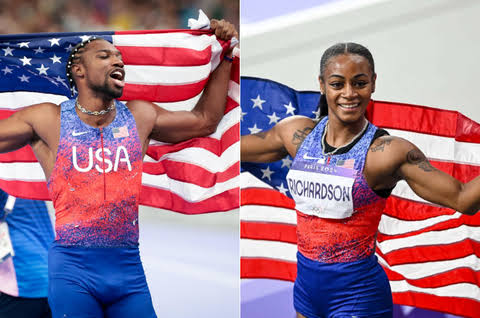
The athletics world thrives on moments of brilliance, speed, and the roar of stadiums, but sometimes the most impactful moments happen not on the track, but through words. Noah Lyles, the reigning sprint king and global ambassador of the sport, recently stunned fans and officials alike when he came out with an impassioned defense of fellow American star Sha’Carri Richardson. In a press conference that quickly spread across social media, Lyles stated, “What is happening to Sha’Carri Richardson is a crime against athletics. How can someone be so cruel as to abandon and attack a 25-year-old girl who is carrying the responsibility and hope of the entire United States?”
Those words were enough to turn heads. Sha’Carri Richardson, the 2023 World 100m champion and one of the sport’s most electrifying figures, has long been a polarizing athlete. Known for her unapologetic personality, fearless style, and fiery spirit, she has had her fair share of critics alongside a legion of loyal fans. Recently, however, a storm of criticism and abandonment from certain corners of the athletics establishment cast a dark shadow over her journey. For many, it felt as though Richardson was being unfairly singled out, her flaws magnified while her triumphs were ignored.
Noah Lyles’ intervention changed the entire narrative. Lyles, himself no stranger to criticism and pressure, voiced what many athletes had quietly felt but were hesitant to say aloud. His twelve-word warning, delivered firmly and without hesitation, reverberated like thunder: “If you destroy her spirit, you destroy the future of athletics.”
Those words electrified the athletics community. Social media erupted, with hashtags supporting Sha’Carri trending worldwide. Fans praised Lyles for stepping up in a moment where silence had been the easier option. Fellow athletes, too, chimed in, some openly echoing his sentiment, others cautiously debating whether Richardson’s struggles should be treated with more understanding or stricter accountability. The debate was raw, emotional, and impossible to ignore.
But the story didn’t end there. Just five minutes after Lyles’ speech, the so-called perpetrator—an unnamed federation official accused of orchestrating the harshest criticisms against Richardson—spoke out in defense of their actions. They insisted that Richardson was being “treated fairly” and that “accountability must remain central to elite sport.” Their response, however, only added fuel to the fire. For every supporter of stricter discipline, there were dozens who echoed Lyles’ sentiment: Sha’Carri deserves good things, not relentless punishment.
What made Lyles’ stand even more powerful was its timing. He chose to speak not at a moment of personal glory, but during the lead-up to another major competition. He shifted the spotlight from himself—the world’s fastest man—to a teammate who has battled both victories and demons under the glare of public scrutiny. It was not simply an act of solidarity; it was a demand for compassion.
Richardson’s story has always been bigger than the stopwatch. From personal tragedies to high-profile setbacks, she has lived her journey in full view of the world. That transparency has made her a lightning rod, but also a beacon of resilience. Lyles’ defense served as a reminder that athletes are more than their results; they are human beings carrying extraordinary weight.
The message is now crystal clear: she deserves good things. Whether that means fair treatment, genuine support, or the space to grow without constant attack, the words of Noah Lyles have set a precedent for how the athletics community should treat its brightest stars. For Richardson, this moment may not erase the battles she has faced, but it ensures that she is no longer fighting them alone.
Be the first to comment